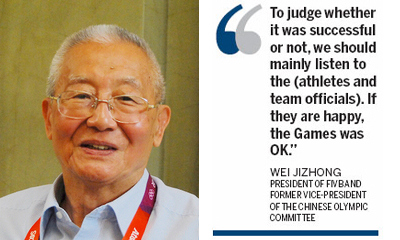'There is no perfect Olympics'
 0 Comment(s)
0 Comment(s) Print
Print E-mail China Daily, August 13, 2012
E-mail China Daily, August 13, 2012
Former Chinese Olympic Committee vice-president Wei Jizhong urged the public not to compare the London Olympics with the "unparalleled" Beijing Games.
Although London's plan for hosting the Games echoed the International Olympic Committee's (IOC) decision to scale down the event, international media remained critical about the operation. Transportation, security and press services were among the targets, and comparisons to Beijing were inevitable.
Wei said the comparisons were unfair.

"Different countries deliver different styles of organization, and that's based on their different conditions and appeal," Wei, the president of volleyball's governing body, FIVA, told China Daily on Friday.
"China is a developing country and it was keen to show its modernization achievements by hosting the event in spectacular fashion in 2008.
"But it's different here in Britain, where they have just provided the necessary facilities and services for the competition to run smoothly."
Wei said the London Organizing Committee (LOCOG) did what was needed, at least in volleyball.
Wei, who oversaw both indoor and beach volleyball, said he was basically satisfied with the event's organizing work and said most of the athletes and NOC officials agreed with him.
"To judge whether it was successful or not, we should mainly listen to the (athletes and team officials)," he said. "If they are happy, the Games was OK."
Wei, who met with IOC president Jacques Rogge earlier this week, indicated Rogge was happy with LOCOG's work.
Wei said what problems and complaints there were didn't take away from London's overall good work.
"There is no perfect Olympics in history - even Rogge described the Beijing Games as 'exceptional' four years ago," said Wei, who was a senior advisor on the Beijing organizing committee.
"We can't use Beijing's standard to measure London, as they were held in two very different countries."
Wei said the two editions worked successfully to alter the world's stereotypes of their respective national characters.
"In my opinion, the British used to be considered as pretty conservative and less-optimistic in the world. But we see the cheering crowds packed into every venue, fiercely supporting the host, even at some unpopular events," he said.
"People started to feel passion for the nation and its people's enthusiasm for sports. I think that's kind of the spiritual legacy of the Games."
Wei also praised the practically designed temporary venues, even though local media complained they are "too simple" for the biggest prestigious sporting event in the world.
With the help of FIVB, all the sand used at the Games' beach volleyball venue will be used to build 35 beach courts across the country for the sport's development in Britain.
"It's a great way to continue the post-Olympic momentum to benefit their society," Wei said.
Wei, whose four-year term with FIVA will end after the Olympics, said he won't look for re-election and hopes his successor will be chosen by a transparent election.
"I've done my best and I would like to give the position to a new face and new ideas," the 75-year-old Zhejiang native said.
Wei's term featured the democratic reform of FIVA's political regime, introduction of new technology and a foundation to boost the game's growth in developing countries.
The lone item on Wei's wish-list for his successor the candidates include Doug Beal of the United States, Brazilian Ary Graca and Australian Chris Schacht - is that they bring in more endorsements.
"I hope the next leader will carry on the current momentum and advance with the times," Wei said. "We need more sponsors to provide financial support, (though we don't need to get carried away with it). Our goal is to develop the sport, not make money."






Go to Forum >>0 Comment(s)